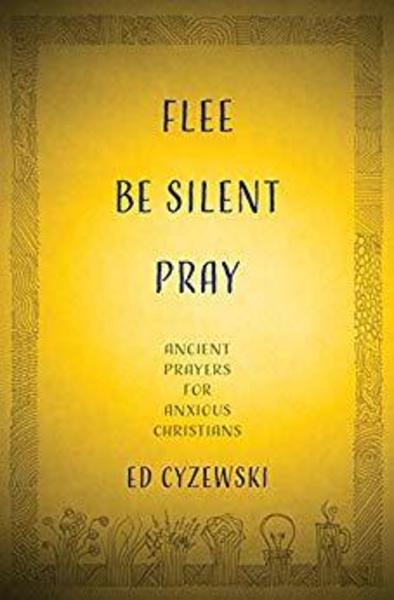SOURCE português inglês alemão francês espanhol italiano neerlandês polaco russo
Download a free preview.GET MY BOOKWhat if prayer could be simple rather than strenuous? Anxious, results-driven Christians can never pray enough, serve enough, or study enough.
What if God is calling us not to frenzied activity but to a simple spiritual encounter?
What if we must merely receive what God has already given us?
In Flee, Be Silent, Pray, writer and contemplative retreat leader Ed Cyzewski guides readers out of the anxiety factory of contemporary Christianity and toward a God whose love astounds those quiet long enough to receive it. Cyzewski offers helpful guidance into Christian spiritual practices such as:
- Solitude
- Silence
- Contemplative prayer
- Spiritual practices such as lectio divina and the Examen
Readers will learn to make space for the Christ whose yoke is easy and whose burden is light.
Ready to shed the fear of the false self and the exhaustion of a duty-driven faith?
Flee. Be silent. Pray.
Ready to shed the fear of the false self and the exhaustion of a duty-driven faith?
Flee. Be silent. Pray.

So much of my Christian spiritual formation has been hindered by a nagging question:
Am I doing this right?
I want to pray in ways that are authentic and sincere.
I want to be pray with the right techniques.
And these desires all lead to one overarching need when it comes to prayer: I want to guarantee a particular outcome from prayer. If I do this “right,” then authentic contemplative prayer guarantees a particular kind of encounter with God.
Everything hinged on the outcome and my belief that I could control it. If I just meant it a little bit more, prayed with a slightly better focus, examined my conscience a little more thoroughly, or practiced sitting in silence a little bit longer, then perhaps my prayer life would finally take off.
And by take off, I mean that it would yield RESULTS–stuff I can point at as evidence of God and of my own goodness. Of course the risk with such evidence of God and my own holiness is that I don’t really need all that much faith to pray and I will face the temptation to hold my own holy experiences over the mere novices that can hardly string a few minutes of prayer together.
Such an approach to “authentic” prayer is more like I’m taking myself off the rails.
Seeking a spiritual experience or “consolation” as an outcome from a time of prayer is a common trap that Christians face in their spiritual growth. Contemplative prayer teachers such as Thomas Merton and Martin Laird warn us that such examination or prayer is quite common. Thomas Keating notes that the thought of enjoying contemplative prayer can turn into a distraction that pulls us out of a moment of intimacy with God.
So, what does authentic contemplation look like?
Cynthia Bourgeault writes that it’s a returning, again and again, to a sacred word, image, or practice, such as breathing. It is a complete reliance on God who has given us everything need and dwells within us before we even had a chance to prove our piety and worthiness.
God’s grace is upon us while we pray, and so we can let go of our desire to prove ourselves or our techniques as authentic. We can only clear space in our schedules and our minds for what God provides.
You don’t have anything to prove to God. You can only receive what God gives. The pressure is off. The silence is an invitation, a moment to live by faith in the present love of God that has always been here for you through the work of Jesus the Son and the indwelling of the interceding Holy Spirit.

 inundado por um mistério de luz que é Deus e N´Ele vi e ouvi -A ponta da lança como chama que se desprende, toca o eixo da terra, – Ela estremece: montanhas, cidades, vilas e aldeias com os seus moradores são sepultados. - O mar, os rios e as nuvens saem dos seus limites, transbordam, inundam e arrastam consigo num redemoinho, moradias e gente em número que não se pode contar , é a purificação do mundo pelo pecado em que se mergulha. - O ódio, a ambição provocam a guerra destruidora! - Depois senti no palpitar acelerado do coração e no meu espírito o eco duma voz suave que dizia: – No tempo, uma só Fé, um só Batismo, uma só Igreja, Santa, Católica, Apostólica: - Na eternidade, o Céu!
inundado por um mistério de luz que é Deus e N´Ele vi e ouvi -A ponta da lança como chama que se desprende, toca o eixo da terra, – Ela estremece: montanhas, cidades, vilas e aldeias com os seus moradores são sepultados. - O mar, os rios e as nuvens saem dos seus limites, transbordam, inundam e arrastam consigo num redemoinho, moradias e gente em número que não se pode contar , é a purificação do mundo pelo pecado em que se mergulha. - O ódio, a ambição provocam a guerra destruidora! - Depois senti no palpitar acelerado do coração e no meu espírito o eco duma voz suave que dizia: – No tempo, uma só Fé, um só Batismo, uma só Igreja, Santa, Católica, Apostólica: - Na eternidade, o Céu! 